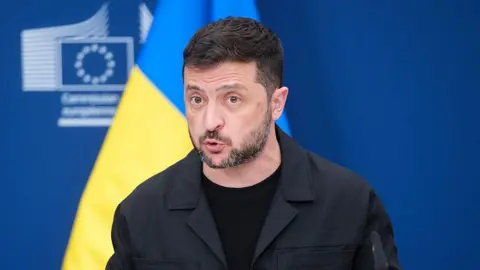The recent diplomatic discourse pertaining to Ukraine suggests that the upcoming meeting set to take place in Washington could significantly impact the future of Ukraine and broader European security. This situation is contrasted with the previous US-Russia summit that took place in Alaska, although the latter garnered headlines, it fell short of meaningful outcomes vital for Ukraine. The discussions held between President Vladimir Putin and former President Donald Trump did not yield the anticipated ceasefire or sanctions against Russia, leading many to question the implications of these powerful nations crafting agreements that could potentially sideline both Ukraine and its European allies.
Ukraine and its supporting nations are keen to prevent a clandestine resolution resulting from the summit. There is a growing concern about reiterating that peace negotiations concerning Ukraine must involve direct Ukrainian participation and the establishment of robust security guarantees. The presence of prominent leaders, such as Sir Keir Starmer of the UK, President Emmanuel Macron of France, and Chancellor Olaf Scholz of Germany, in Washington alongside President Volodymyr Zelensky indicates a concerted effort to convey these critical messages to President Trump.
The leaders aim to ensure that President Trump is not influenced solely by his amicable rapport with Putin, which could lead to concessions detrimental to Ukraine’s sovereignty. They collectively advocate for Ukraine’s interests at the negotiating table and underscore the importance of maintaining a front that showcases unity between Ukraine and Europe.
The diplomatic environment surrounding the meeting will undoubtedly be pivotal, particularly for Sir Keir Starmer, whose ability to engage effectively with Trump will be scrutinized given his favorable position with the US President. The realities of the summit, however, are clouded with complexities. A peace deal that involves territory losses for Ukraine raises significant ethical and practical questions, especially considering the sacrifices endured by countless individuals defending their homeland.
Zelensky’s repeated assertions that he will not concede any land, backed by constitutional mandates, further complicate negotiations. However, the geopolitical circumstances indicate that Russia has little intention of returning annexed territories like Crimea, while firmly controlling a substantial portion of the Donbas region. Some suggest, as expressed by Kaja Kallas, a former Estonian Prime Minister, that a victory for Ukraine might not be solely contingent upon reclaiming lost land but rather securing Article 5-like security guarantees that deter future aggression, ensuring Ukraine remains a sovereign nation.
Current discussions indicate a proposed arrangement that could involve territorial concessions in exchange for security commitments from Western nations. Yet, many Ukrainians are reluctant to accept any terms that involve loss of land, particularly in light of the cost of lives already lost in defense of these territories. Concerns linger around whether such arrangements would render Ukraine vulnerable and create a precarious border with Russia, particularly when contemplating that up to 30 percent of Donetsk Oblast remains under Russian occupation.
Moreover, the idea of forming a Coalition of the Willing, which initially saw aspirations for an extensive military presence to deter Russian advances, appears to have evolved into a more cautious strategy aimed at safeguarding air and maritime domains while supporting Ukraine’s military rebuild efforts. The transition from ambition to pragmatism reflects the current realities on the ground and the ongoing risks associated with a potential Russian resurgence following any cessation of hostilities.
As military experts assert that a halt in fighting could allow Putin to rearm and prepare for renewed aggression, the international community’s vigilance will be necessary to navigate this precarious landscape. The hope remains that any dialogue stemming from Washington can facilitate a pathway that ensures not only the cessation of immediate conflict but safeguards the sovereignty of Ukraine against future threats. In this intricate geopolitical theater, the stakes are enormous, and the outcome of the upcoming talks is awaited with bated breath across the globe.












